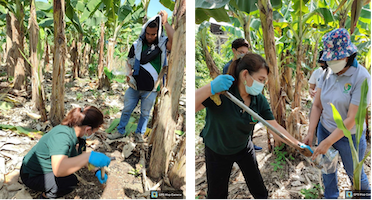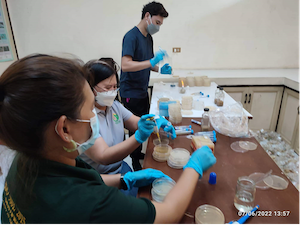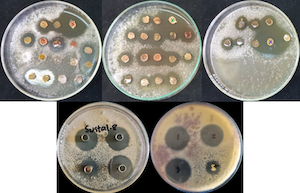 Eleven new bacterial isolates were found promising in formulating a biological control agent that can prevent if not eradicate occurrence and spread of Foc TR4, which causes fusarium wilt or the deadly Panama disease in Cavendish banana. This is based on initial findings of a project funded by the Department of Science and Technology (DOST).
Eleven new bacterial isolates were found promising in formulating a biological control agent that can prevent if not eradicate occurrence and spread of Foc TR4, which causes fusarium wilt or the deadly Panama disease in Cavendish banana. This is based on initial findings of a project funded by the Department of Science and Technology (DOST).
Fusarium wilt, commonly known as Panama disease, is one of the most serious problems of banana plantations in Mindanao. Symptoms include yellowing and hanging of leaves, splitting of pseudostem, producing unmarketable bunches, and ultimately dying of plants. Previous studies recorded an eradication of 30,000 affected plants from 1974 to 1991. The outbreak in Cavendish banana was observed 2002. New infections were more severe and faster to spread.
 The University of the Philippines Los Baños-National Institute of Molecular Biology and Biotechnology (UPLB-BIOTECH) implements this three-year project led by Ms. Irene A. Papa. Ms. Papa and her research team isolated and purified bacterial species from mixed culture plates. A total of 384 microorganisms were isolated from soil samples taken from Cavendish banana areas in Kapalong and Sto. Tomas, Davao del Norte.
The University of the Philippines Los Baños-National Institute of Molecular Biology and Biotechnology (UPLB-BIOTECH) implements this three-year project led by Ms. Irene A. Papa. Ms. Papa and her research team isolated and purified bacterial species from mixed culture plates. A total of 384 microorganisms were isolated from soil samples taken from Cavendish banana areas in Kapalong and Sto. Tomas, Davao del Norte.
Out of the 384 microorganisms, 68 had inhibitory effects against Fusarium wilt. The 66 isolates identified belong to Actinobacteria, a group of microorganisms, which can be useful microbial resources for agricultural, medical, and industrial applications.
Ms. Papa said that the final assay or experimental procedure confirmed that 11 bacterial isolates have high potential for further development into a biocontrol formulation. These can be used in managing Fusarium wilt disease in banana. Her team from the UPLB-BIOTECH is implementing the project in cooperation with the Provincial Agriculture Office of Davao del Norte.
 This project is being monitored by DOST’s Philippine Council for Agriculture, Aquatic and Natural Resources Research and Development (PCAARRD). “The result is very convincing and very promising,” said PCAARRD Executive Director Reynaldo V. Ebora in a recently held Directors’ Council meeting at PCAARRD, Los Baños, Laguna.
This project is being monitored by DOST’s Philippine Council for Agriculture, Aquatic and Natural Resources Research and Development (PCAARRD). “The result is very convincing and very promising,” said PCAARRD Executive Director Reynaldo V. Ebora in a recently held Directors’ Council meeting at PCAARRD, Los Baños, Laguna.
The Philippines was the second biggest exporter of banana in the world market in 2019. It continues to be the most economically important crop but Panama disease remains to be a challenge. Use of chemical inputs for disease control poses risks to humans and environment. With biological control using new discoveries in bacterial isolates, disease management can be more efficient, sustainable, and environmentally sound.
